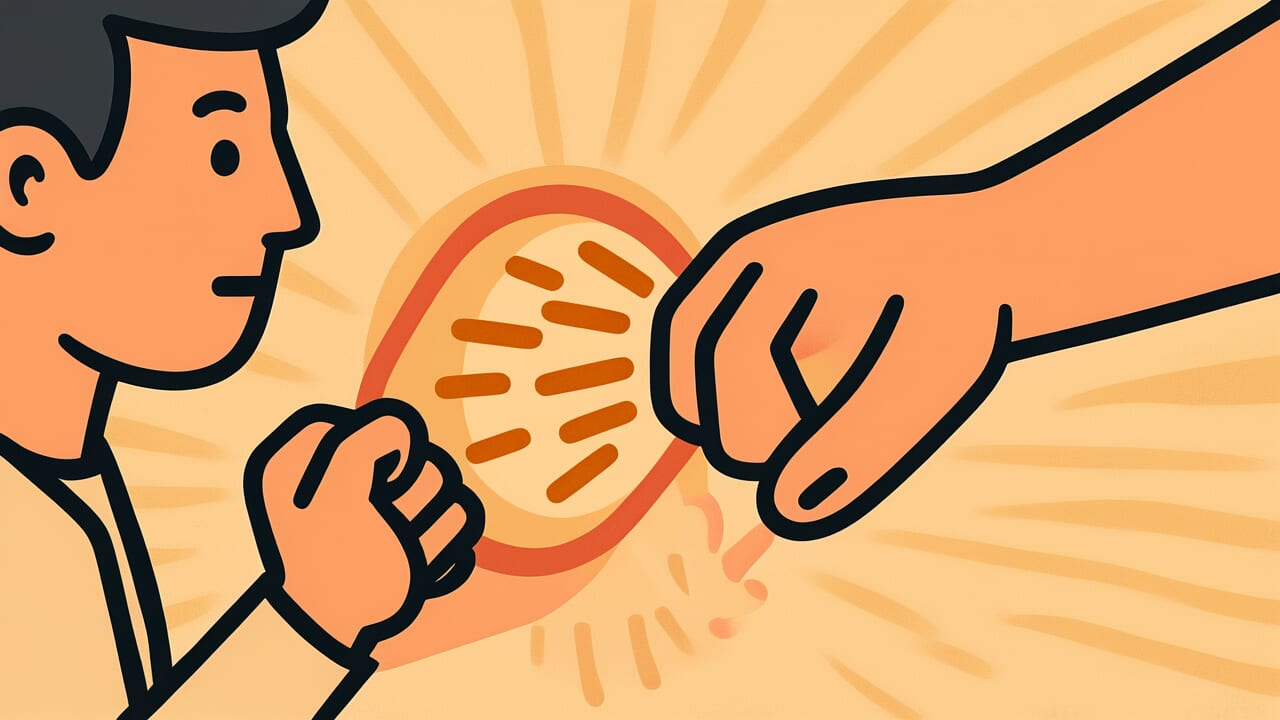How to Read “A stranger’s gentle touch hurts more than a parent’s fist”
Oya no utsu kobushi yori tanin no sasuru ga itai
Meaning of “A stranger’s gentle touch hurts more than a parent’s fist”
This proverb describes a human psychology where light criticism from strangers hurts more than harsh scolding from parents.
Being scolded harshly by your parents is certainly painful. But because it comes from love, you can accept it deep in your heart.
However, casual criticism or cold words from strangers pierce your heart deeply, even when they’re mild.
People use this expression to explain the difference between family strictness and outsider coldness.
Someone might handle severe scolding from family just fine, but feel deeply hurt by light criticism at work or school. This proverb perfectly describes that emotional state.
Even today, many people experience this. They can accept frank feedback from close friends but feel crushed by trivial words from people they barely know.
This proverb accurately captures this delicate human emotion.
Origin and Etymology
The exact source of this proverb is unclear. However, the structure of the words offers interesting insights.
The combination of contrasting actions—”striking fist” and “gentle touch”—forms the core of this proverb.
“Striking fist” represents a physically strong impact. It expresses the harshness of a parent scolding a child through concrete physical action.
“Gentle touch” means to lightly touch or stroke—a mild action. The cleverness of this proverb lies in connecting these two through the sensation of “pain.”
In traditional Japanese family values, parental scolding was understood as the flip side of love.
No matter how harshly children were scolded, they understood it was for their own good. But criticism from strangers, even when mild, pierces the heart deeply because you cannot read the emotions behind it.
This contrast likely emerged from the everyday experiences of common people during the Edo period.
Society back then combined strict discipline within families with a culture that valued public reputation. People were used to parental scolding but felt hurt by casual remarks from neighbors or acquaintances.
This expression sharply captured that human psychology and has been passed down through generations.
Usage Examples
- I was fine being scolded endlessly by my parents, but one comment from my senior made me realize that a stranger’s gentle touch hurts more than a parent’s fist
- I can brush off harsh opinions from family, but casual words from acquaintances sting—that’s what they mean by a stranger’s gentle touch hurts more than a parent’s fist
Universal Wisdom
This proverb has been passed down because it captures two truths deep within the human heart.
First, we have an instinctive ability to sense the presence or absence of love. Second, depending on that sensed love, the same words can be received completely differently.
Harsh words from parents, no matter how intense, contain feelings of care for you. That’s why the deep part of your heart can accept that pain.
But words from strangers carry no such guarantee of affection. You cannot judge whether they truly care about you or are simply criticizing.
This uncertainty is why even light words can leave deep wounds in your heart.
Humans are social creatures. We live constantly aware of how others see us.
That’s why evaluation from strangers, without the safety net of love, shakes our hearts greatly.
This proverb brilliantly contrasts this fundamental human anxiety with the power of family love.
Our ancestors deeply understood how delicate the human heart is and how much it seeks affection.
When AI Hears This
The human brain doesn’t measure pain in absolute values. It actually calculates pain magnitude by how much reality deviates from the expected state.
This is the core of prospect theory.
The brain sets love from parents as a default expectation. The reference point is already positive.
So when a parent hits you, it’s just a loss of “expectation of +10 dropping to zero.” But from strangers, you expect nothing. The reference point is zero.
When they’re kind, you feel “zero became +10.”
More importantly, the human brain feels losses about twice as strongly as gains. This is called loss aversion.
The pain of losing 10,000 yen is twice as large as the joy of gaining 10,000 yen.
Kindness from strangers is “gain obtained from zero,” but even so, it feels lighter than parental violence, which is “loss of something that should naturally be there.”
Because the impact of loss is more than twice that of gain.
In other words, even if struck with the same physical force, a hit from a parent is processed as “minus from lost affection,” while from a stranger as “unexpected attack.”
The reversal phenomenon this proverb describes is evidence that human value judgment is determined by relative deviation from expected values.
Even emotions operate by mathematical formulas.
Lessons for Today
This proverb teaches modern people that the pain of criticism changes greatly not by its content but by who says it.
When you’re hurt by thoughtless words from strangers on social media, understand that it’s not the weight of the words but the thinness of the relationship that amplifies the pain.
At the same time, this proverb teaches the value of harsh words from loved ones.
When family or close friends give you frank opinions, it’s proof of their affection. Being able to accept those words honestly is also your strength.
And if you’re in a position to communicate something to someone, this proverb offers important insight.
Words to people with whom you haven’t built trust may be received far more heavily than you think.
That’s why criticism of others should be careful, and you should choose warm words whenever possible.
How pain is felt is determined more by emotional distance than by the words themselves.



Comments